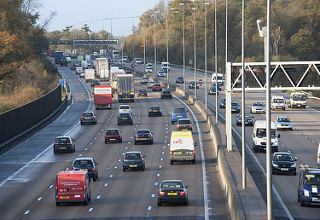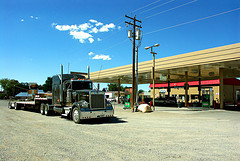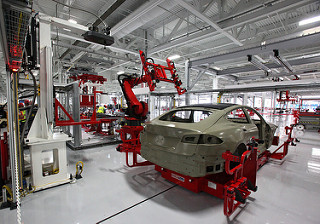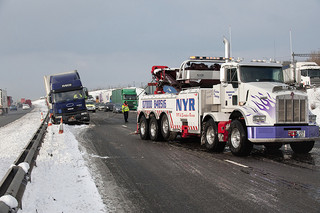The Impact of More Freight Trucks on the Road

Freight truck volume in the U.S. is projected to double over the next decade. This causes significant concern for the environment, road maintenance costs, and highway traffic congestion. Many believe, however, that more trucks are a necessity for economic growth. Take a look at this two-sided dilemma and some possible solutions to the problem.
Freight Trucks Are Bad for the Environment
As more and more trucks enter highways systems around the world, the quantity of carbon dioxide emissions and other harmful exhaust fumes will increase and contribute to global warming and unhealthy air. Poor air quality is already a major problem in many large cities, and more trucks will only complicate the problem further.
Most state governments already regulate the weight of trucks, and the federal government regulates the amount of carbon emissions allowed from freight trucks. A bigger push for fuel-efficient and alternative fuel trucks is needed to combat the carbon emissions problem, though. The federal government should look to incentive programs and tax rebates for switching to these types of environmentally friendly freight trucks.
Freight Trucks Damage the Roads
Switching to environmentally friendly vehicles will not solve the freight truck problem entirely, however, since road maintenance issues will still exist. According to True Cost Blog, freight trucks cause 99 percent of the wear and tear on U.S. roads. However, the truck industry only pays for 35 percent of the maintenance. Taxpayers have to foot the bill for this $60 billion subsidy. This problem raises the question of whether the state or federal government should tax truckers for time on the road.
According to the Coalition Against Bigger Trucks, “We already face a national infrastructure crisis. More than half the bridges on the National Highway System are more than 40 years old, and nearly 25 percent are already either structurally deficient or functionally obsolete.” On top of that, it would cost $121 billion to make repairs to the structurally deficient bridges. Adding heavier trucks to the road could add $53 billion more in costs, which might not be sustainable.
Freight Trucks Cause Highway Congestion
In the past, road networks expanded to combat traffic congestion. Today, this is not a viable option in many densely populated cities where road systems are already highly developed. That’s why many government agencies are looking into other solutions. For instance, Austria has banned certain types of cargo transportation, such as lumber, steel products, and new automobiles.
An increase in truck volume is inevitable around the world because populations are growing. Companies are encouraged to closely look at their supply chains and truck fleets to improve efficiency and minimize the time trucks spend on the road. In many areas, truck drivers are already encouraged to drive at night when they will have a smaller impact on congestion.
Freight trucks are necessary for economic development, but they cause several problems. With innovations in regulations and incentives, government agencies can stay on top of these growing issues.







